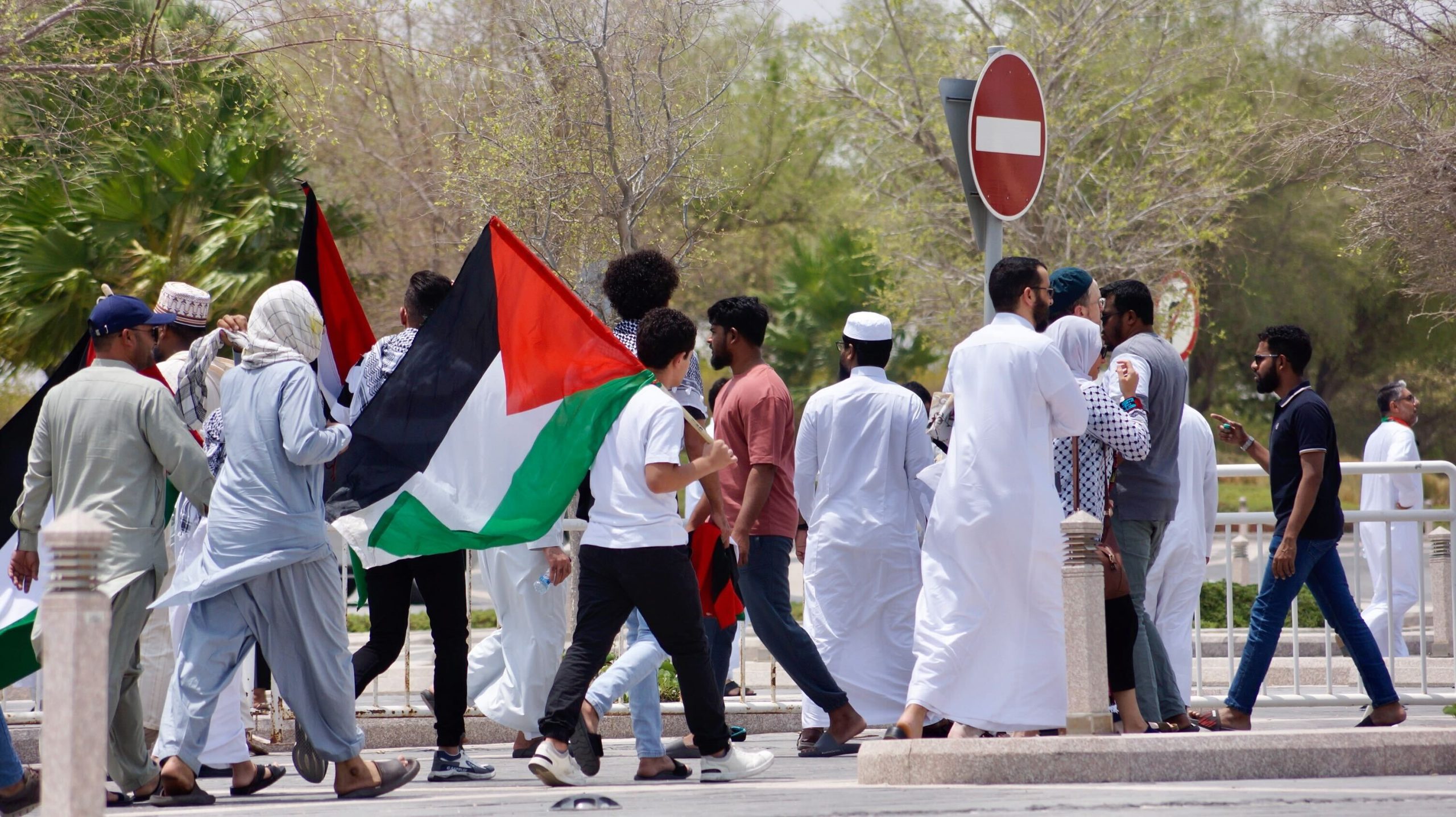Thousands of mourners, including international dignitaries, gathered in Qatar’s Imam Abdul Wahhab Mosque to attend the funeral of slain Hamas political chief Ismail Haniyeh despite scorching 45°C heat.
Qatar’s Imam Abdul Wahhab Mosque was under the global focus on an unusually crowded Friday morning as thousands of mourners, including some who travelled to Doha, flooded the site to bid farewell to slain Hamas political chief Ismail Haniyeh.
Despite the scorching summer temperature of over 45 degrees Celsius and tight security, people from all backgrounds were spread in every corner of the mosque, eagerly wanting to take part in the major event.
The mosque, which witnessed small-scale protests during the beginning of Israel’s genocidal war in the Gaza Strip, witnessed the spirit of solidarity yet again.
In almost every corner, people from different ages and cultural backgrounds were carrying the Palestinian flag and donning the traditional Keffiyeh – a scarf which has become a symbol of resistance.
Rushing into the mosque with an umbrella above his head to protect him from the heat, a 49-year-old Sudanese expat in Doha said he could not feel any prouder for taking part in the funeral prayer.
While his home county is currently witnessing a bloody war, he also used the prayers as a chance to show solidarity with Palestinians.
“Whether it was Ismail Haniyeh or any of their brothers in resistance, we perceive them all as defenders of Jerusalem, the religion of Islam and we are here in solidarity with them and the Palestinian cause,” he told Doha News.
With a scarf of the Palestinian flag wrapped around her neck, Shaza Hasan, another Sudanese expat in Doha, described the event as “a moment of pride”.
“Today is a moment of pride for all Arab and Muslim nations. The death of Haniyeh, the patient and valiant Mujahid will only increase our strength and fortitude […]. It is a jihad, whether with victory or martyrdom,” she told Doha News.
Israel assassinated Haniyeh alongside his bodyguard, Wasim Abu Shaaban, in Tehran in a pre-dawn explosion on Wednesday.
An investigation into the killing by The New York Times on Thursday alleged that Haniyeh was killed using an explosive device which was smuggled into his place of residence.
However, the accurate details of the assassination remain blurred.
While the killing of Haniyeh shocked the world, many saw it as a predictable move by Israel given its targeting of Palestinian resistance and prominent figures fighting against the occupation of their homeland.
This was the thought of a 56-year-old Egyptian expat in Doha at the funeral prayers.
“[The killing of Haniyeh] is nothing new to them […] the martyr Ismail Haniyeh was a great leader and resistance fighter. He angered the Zionists and this is a natural end for all Mujahideen brigades. We are proud to attend the funeral today,” he said.
Imad, a Palestinian expat from Tulkarm in Doha, described the slain leader as a leader of Muslim nations.
“The martyrdom of Ismail Haniyeh is a major loss for the Muslim Ummah. While he’s a Palestinian leader, he represented the Ummah. He always advocated for Muslim unity,” he told Doha News while waving the Palestinian flag.
“He sacrificed his sons and family before he eventually followed them. May his soul rest in peace,” he said.
Qatar, a crucial mediator between Israel and Hamas, was among the countries that condemned the killing of Haniyeh, describing it as a “heinous crime”.
Qatar’s Amir Sheikh Tamim bin Hamad Al-Thani was also the only Arab leader at Haniyeh’s funeral prayer.
Father Amir Sheikh Hamad bin Khalifa Al–Thani, the Gulf state’s former leader attended the funeral prayer.
Some of the senior Qatari officials in attendance included Prime Minister and Minister of Foreign Affairs Sheikh Mohammed bin Abdulrahman Al Thani as well as Qatar’s Deputy Prime Minister and Minister of State for Defence Affairs, Khalid bin Mohammed Al Attiyah.
Meanwhile, funeral prayers in absentia were held in different parts of the world, including Morocco, Pakistan and Türkiye, where Friday was observed as a national day of mourning.
Haniyeh’s body was then laid to rest at the Founder Imam Cemetery in Lusail in the afternoon.
Israel has killed other Hamas officials over the years.
In 1996, Israel assassinated Hamas military leader Yahya Ayyash in Gaza’s Beit Lahiya, followed by the assassination of Hamas spiritual leader and founder Sheikh Ahmed Yassin in an Israeli air strike in Gaza in March 2004.
A month later, Israel assassinated Yassin’s successor and Hamas co-founder Abdel Aziz Al-Rantisi in an airstrike in Gaza City. A decade later, Israel killed senior Hamas official Saleh Al-Arouri in a drone strike in Beirut in January 2024.
Haniyeh and his family were also key targets of Israel.
In April, Israel killed Haniyeh’s three sons—Hazem, Amir and Mohammed—while they were visiting relatives for Eid at Gaza’s Shati refugee camp. The occupation forces also killed four of his grandchildren—Mona, Amal, Khaled and Razan.
At the time, Haniyeh said Israel had killed around 60 of his family members.
Then, in June, Israel killed Haniyeh’s mother, 80-year-old Zahr Abdel Salam Haniyeh, along with nine other family members in Gaza’s Al-Shati refugee camp.
However, many believe that only more resistance fighters will emerge to carry Haniyeh’s message.
“Only a million other Haniyeh will be born after his demise. The [Palestinian cause] is one for a lifetime,” Sudanese expat Hasan told Doha News.







